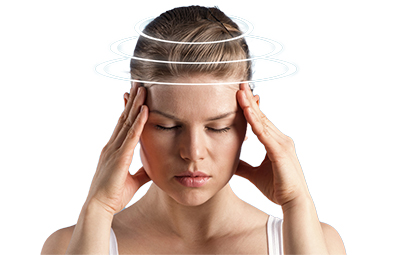Vertigo

Understanding Vertigo:
Vertigo is a symptom rather than a condition itself, characterized by a spinning or whirling sensation that can make you feel off balance. It is often accompanied by other symptoms, such as dizziness, nausea, vomiting, and difficulty with coordination. Vertigo is commonly caused by problems in the inner ear, but it can also be related to issues in the brain or nervous system.
Causes of Vertigo:
Vertigo can be caused by various factors, including:
1. Benign Paroxysmal Positional Vertigo (BPPV): The most common cause of vertigo, BPPV occurs when tiny calcium crystals in the inner ear become dislodged and stimulate the inner ear's balance organs, leading to brief episodes of vertigo.
2. Meniere's Disease: This chronic condition affects the inner ear and is characterized by recurring episodes of vertigo, hearing loss, tinnitus (ringing in the ears), and a feeling of fullness in the affected ear.
3. Vestibular Neuritis: Inflammation of the vestibular nerve, often due to a viral infection, can cause sudden vertigo that lasts for days or weeks.
4. Labyrinthitis: Similar to vestibular neuritis, labyrinthitis involves inflammation of the inner ear, leading to vertigo, dizziness, and hearing loss. It is commonly caused by viral or bacterial infections.
5. Migraine-Associated Vertigo: Some individuals with a history of migraines may experience vertigo as a component of their migraine attacks.
6. Acoustic Neuroma: A benign tumor that develops on the vestibular nerve can cause vertigo, as well as hearing loss and tinnitus.
Treatment Options:
Treatment for vertigo aims to alleviate symptoms and address the underlying cause. Dr. Seejo George offers a range of effective treatment options, including:
1. Canalith Repositioning Maneuvers: For cases of BPPV, specific head and body movements can help reposition the displaced calcium crystals in the inner ear, providing relief from vertigo.
2. Medications: Depending on the underlying cause, medications such as vestibular suppressants, antihistamines, or anti-nausea drugs may be prescribed to manage vertigo symptoms.
3. Vestibular Rehabilitation Therapy: This specialized form of physical therapy involves exercises and maneuvers designed to improve balance and reduce dizziness. It can be highly effective in treating vertigo caused by inner ear disorders.
4. Lifestyle Modifications: Dietary changes (such as reducing sodium intake), avoiding triggers (in the case of migraines), and adopting stress-management techniques can play a significant role in managing vertigo symptoms.
5. Surgical Intervention: In rare cases where vertigo is caused by structural abnormalities (e.g., acoustic neuroma), surgical intervention may be necessary to resolve the underlying issue.
Consulting an Otolaryngologist:
If you are experiencing recurring or persistent vertigo symptoms, it is crucial to consult with an experienced Otolaryngologist like Dr. Seejo George. With expertise in diagnosing and managing vertigo, he will conduct a comprehensive evaluation, including a physical examination, and if necessary, additional diagnostic tests to determine the cause. Based on the findings, he will develop a personalized treatment plan to address your specific needs, aiming to alleviate vertigo symptoms and improve your overall quality of life.
Don't let vertigo hinder your daily activities. Contact Dr. Seejo George's office today to schedule an appointment and take the first step towards effective vertigo management.






